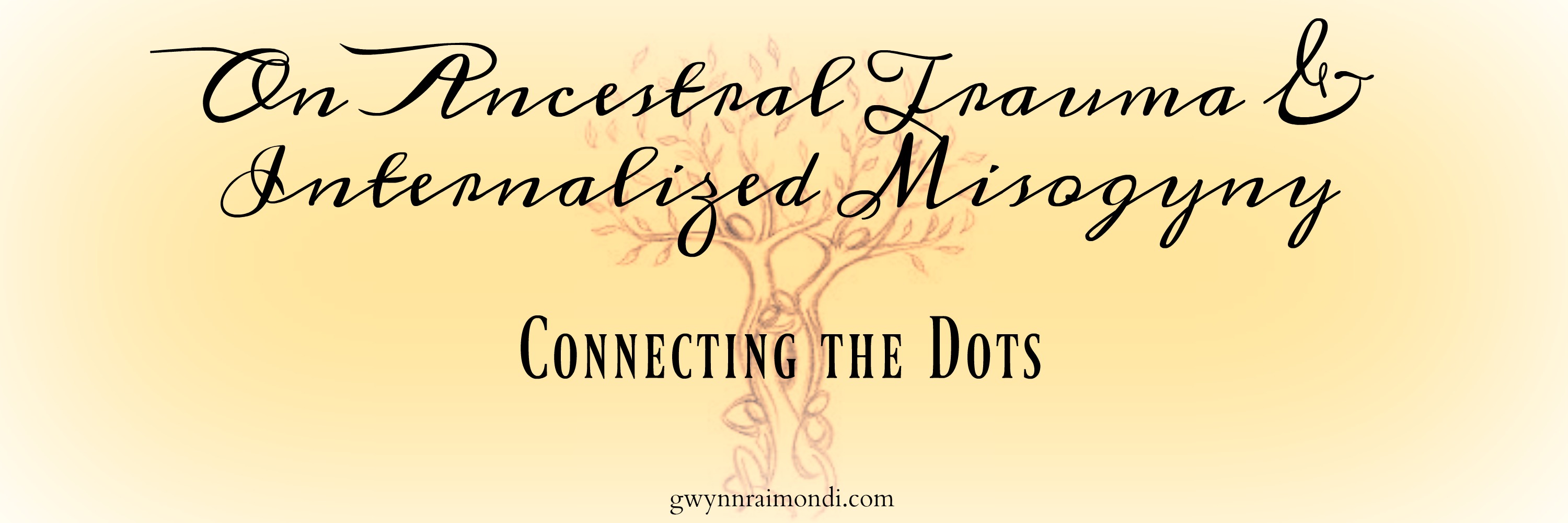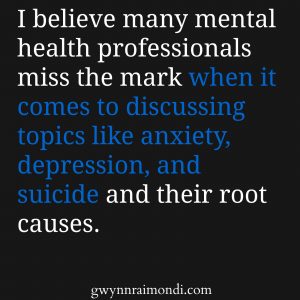Internalized misogyny does not refer outright to a belief in the inferiority of women. It refers to the byproducts of this societal view that cause women to shame, doubt, and undervalue themselves and others of their gender. It shows up even in the most feminist and socially conscious of us. And it’s insidious.
~Suzannah Weiss, 7 Sneaky Ways Internalized Misogyny Manifests in Our Everyday Lives (Bustle, December 18, 2015)
So just why is it important to process the ancestral trauma that lives within us and to put focus on dislodging our internalized misogyny?
Because we, as women, will never find freedom or equality if we don’t.
Sounds kinda dramatic, doesn’t it? Yet, it is true.
All women have varying degrees of internalized misogyny. It is impossible to not have it. When we are raised in a culture (and in families) that constantly tell us how we are inferior, how we are mere objects, how we don’t matter, how we are stupid, worthless, and not fully human, how we should feel shame about our anatomy and body shape, the only possible outcome is for those messages to find their ways into our psyches, into our bodies, into our very being.
These messages not only impact how we think of ourselves, it also deeply influences the way we look at and treat other women.
The so called “Mommy Wars”? That was (and is) all about internalized misogyny.
Every time we comment or judge the way another woman does something, that she isn’t doing it “right” or “good enough” or that she is taking “too much” time or space – that is all internalized misogyny.
When we judge the way a woman dresses. How she wears her hair. Whether or not she’s wearing make up.
When we judge a woman based on whether or not she has children (or even wants children). When we judge a woman who has children about whether or not she works outside the home.
Internalized misogyny.
Anytime we look at other women and judge them as not enough, as too much; every time we don’t believe another woman’s personal lived experience; each time we criticize and ridicule women for the choices they have made about their own damn lives…
All internalized misogyny.
(Note: criticism and ridicule are very different from critique. Critique is loving and encourages growth. Criticism and ridicule is spiteful or hateful and encourages shame).
Our internalized misogyny goes further than this too. It shows up in the ways we insist on competing with other women, the ways we feel there are not enough resources for all of us, the ways we fight over men, jobs, minutia and technicalities.
It shows up in the ways we insist upon enacting revenge upon other women when we feel we have been harmed.
It shows up in a million different big and small ways, every day.
It lives in our consciousness and our unconscious minds.
It is a by-product of not only our ancestral trauma, but also our inter-generational and cultural relational trauma.
It is a part of us, whether we like it or not.
One of the ways we see our internalized misogyny is Mean Girl™ behavior. Think back to middle school and the “cool kids” and how the “cool girls” treated everyone else.
They were bullies.
Here’s a thing though, this behavior doesn’t stop at middle school.
I see this type of behavior happening all over social media, perpetrated by ADULT WOMEN who are leaders in the feminist movement.
Yes, I have witnessed bona fide feminists, women who fight for social justice, who insist on being treating as equals and tearing down the status quo, who have been doing this work for decades, using the exact tools of the status quo of domination, authoritarianism, shaming, and othering.
(And then witnessed their followers, who seem more like sychophants, cheering them on!)
This is why we need to focus on our internalized misogyny. Because tearing down other women will never get us to where we need to be. It will never bring us the world we want for ourselves, our daughters and nieces, our granddaughters and grandnieces. Or our sons and nephews for that matter.
Our internalized misogyny is deeply rooted in our ancestral trauma. It lives in our blood and muscles and cellular make up. It is in our very DNA.
For women of European descent, consider how it must have been to be a woman living in the time of the “Witch Trials” and watching your own mother or daughter or best friend being raped, tortured, and burned alive in front of you and others in the town square?
For women who are descendants of slaves, imagine the pain of having your children torn from you and sold at auction. Imagine witnessing beatings at the hands of other (white) women, or worse when the slave masters would insist the slaves beat each other.
We can find examples from across the globe and across history of this kind of brutality inflicted upon women – mostly for simply being women – that women were witness to.
Being witness to that type of horror has its impact; it is traumatizing. What our ancestors witnessed and experienced still lives today in our DNA. And it shows up in the ways we don’t trust other women, the ways we criticize them, the ways we try to dominate and oppress them.
It shows up in the cautionary tales we tell our daughters about what to wear or how to act or the stories about those types of women.
In many ways our internalized misogyny was originally a survival mechanism. It helped to keep us alive, it helped to keep our daughters alive.
But the tools aren’t useful or helpful anymore. And in order for true social change to occur, we need to start with change within.
This is why I believe as part of our own liberation we need to explore and process our ancestral, inter-generational, and cultural relational traumas and become curious and aware of our internalized misogyny so we can begin to dislodge it, do different, and stop passing it on.
This is why for the past three years, every spring, I offer this intimate online circle centered around our ancestral trauma and internalized misogyny.
Because this is one more piece to the puzzle that will help bring about our liberation. Is is a vital piece that will help insure we do not simply use the tools of the patriarchy against other women so we ourselves can be reap the benefit.
We are all in this together. And until all of us are free, none of us are free.
…
If you’d like to learn more about the upcoming spring circle, Unleashing Ourselves: Processing Ancestral Trauma & Dislodging Internalized Misogyny that begins April 1, you can click here.
Did you miss the educational essay and video series I wrote introducing the ideas and concepts we’ll be exploring and examining in the spring circle? If so, you can find them at the links below:
Defining Ancestral, Inter-generational, & Cultural Relational Traumas and Internalized Misogyny
Connecting Individual & Collective Traumas
Ending Cycles: Processing the Past & Changing the Future
The importance of processing Ancestral Trauma & Dislodging Internalized Misogyny (this essay)
More About the Unleashing Ourselves Circle
You can find the FAQ for this circle here.
Below are three essays I wrote prior to the 2017 offering of this circle.
Unleashing Our Self :: Mothers, daughters, and generations of trauma
Unleashing Our Self :: The loss of sisterhood
Unleashing Our Self :: Disconnection, shame, & thinking it is us


 As I continued talking in my session, I realized how I believe many mental health professionals miss the mark when it comes to discussing topics like anxiety, depression, and suicide and their root causes. How they ignore the impacts living in this culture has on all of us. How the interconnections and intersections of our own lived experiences, our culture, and our ancestral history affect us. How living in a culture where women and girls are only seen as valuable when it comes to the male gaze. How sexual assault and harassment take their toll on our mental and physical health – DAILY – whether we have personally experienced either or now. How witnessing rape and or being raped impact us to the point of considering and for some attempting suicide (According to the National Center for PTSD, it’s estimated that one in three women who have been raped contemplate suicide, and one in 10 victims attempt it.) How culturally it is more important to us to protect rapists than the person who was raped. (Remember how Brock Turner received an incredibly lenient sentence because the (white male) judge didn’t want to impact Brock’s precious future?)
As I continued talking in my session, I realized how I believe many mental health professionals miss the mark when it comes to discussing topics like anxiety, depression, and suicide and their root causes. How they ignore the impacts living in this culture has on all of us. How the interconnections and intersections of our own lived experiences, our culture, and our ancestral history affect us. How living in a culture where women and girls are only seen as valuable when it comes to the male gaze. How sexual assault and harassment take their toll on our mental and physical health – DAILY – whether we have personally experienced either or now. How witnessing rape and or being raped impact us to the point of considering and for some attempting suicide (According to the National Center for PTSD, it’s estimated that one in three women who have been raped contemplate suicide, and one in 10 victims attempt it.) How culturally it is more important to us to protect rapists than the person who was raped. (Remember how Brock Turner received an incredibly lenient sentence because the (white male) judge didn’t want to impact Brock’s precious future?)